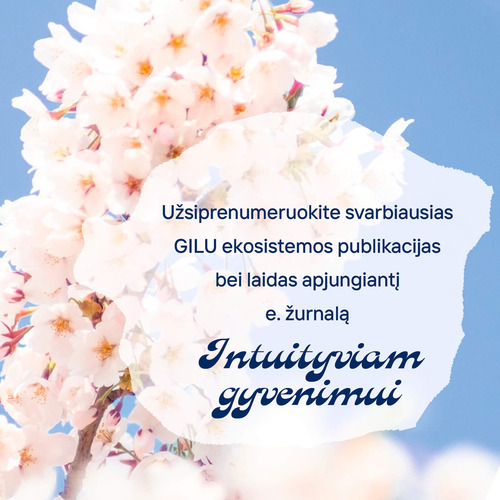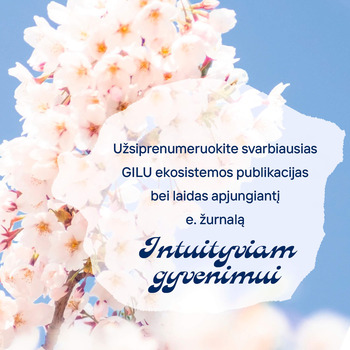Educational articles
- Home
- Educational articles
- On the creative mind in tomorrow's world
On the creative mind in tomorrow's world
2023 06 05Rasa Baltė Balčiūnienė
Founder of HAI Institute, business psychologist
After many years of activity, reflection and application of psychological practices, I understand more and more that human beings exist in order to give birth to new ideas that stimulate growth through them. The creative mind is the ability to see the future and to create in the long term. Creative solutions give us both functionality and aesthetic satisfaction. They prosper new phenomena, new logic, new quality. It is important to stress that true creativity is not born from previous logic, solutions, knowledge - improving a process or an object does not equal true creativity.
Studies show that only 2% of adults are able to come up with innovative solutions (98% of children under 5). The brain seeks to maintain a comfortable, low-energy automatic mode, to protect against mistakes, unpleasant emotions, etc. People often feel that it is risky to choose creative thinking, but it is worth it, because new functional connections are made between areas or sub-areas that at first glance do not seem to connect.
With the current popularity of 'ChatGPT' and similar applications, there are fears that artificial intelligence could replace humans. However, AI applications rely on existing, repetitive and formalised knowledge. In contrast, there is an unspoken knowledge in humans that is intuitive, non-stereotyped (when enough wisdom is accumulated). This knowledge helps to develop a creative mind. People who develop a strong creative mind will always have a competitive advantage, even over artificial intelligence, which relies only on structured knowledge. Man is a creative being, able to go beyond formal knowledge and create what was previously unheard and unseen.
The levels of knowledge required for the expression of the creative mind
Data. These are single facts or points of information. They are meaningless without context and interpretation. For example, is 38°C (without context) good or bad? It is not clear which degrees we are talking about here: the temperature of the human body, the air or the water. We would get different conclusions in different contexts.
Information. When data is applied or interpreted in a specific context, information is created. A human body temperature of 38°C is already defined information, so we can draw conclusions.
Knowledge. Enables decisions and actions by providing a context for understanding information. A person's body temperature of 38°C is not good because the normal temperature is 36.6°C. The conclusion is that the person has a fever and a solution needs to be found. There is a certain logic and order in knowledge.
Knowledge or understanding. Contextual or wider knowledge. You have been in the situation before and know the best decision to make. Is it worth calling an ambulance when your temperature is 37°C? Absolutely not. What if it's 38° C? Perhaps you should contact your GP first? We make a decision based on the context and the knowledge we have.
The more often a person is exposed to different situations, the more knowledgeable they become. Deep knowledge turns into mastery. A master has so much knowledge and practice that he or she not only knows all the possible situations and stereotypical solutions, but is already able to distance himself or herself from them in different contexts and find better, non-stereotypical solutions.
Wisdom. The ability to work simultaneously with several contexts and to offer a personalised solution to each one, based on integrated experience. Wisdom is expressed as informalised knowledge or intuitive knowing. Able to integrate new knowledge into old knowledge and obtain unexpected solutions. Also, being able to recognise different contexts in life phenomena, seeing that different contexts have different purposes, etc. A wise person sees the whole.
Visionary. Ability to see the future. This is an expression of the creative mind, the ability to create new and unexpected contexts of meaning. True creativity is a complex phenomenon, linking all levels of knowledge and requiring a certain openness to ideas in order to express them.
For example, Isaac Newton formulated the theory of gravity by observing a falling apple and asking why the apple was falling straight down instead of sideways or upwards. He specialised in as many as six branches of science and experimented extensively to find the answer. If we want our creative minds to expand, we need to absorb as much knowledge from as many different contexts as possible. We need to read, wonder, experience and reflect on our perceptions.
How to attain and manage knowledge
1. See yourself in a new world. Not yesterday's, but tomorrow's, when artificial intelligence will be fully integrated into society. New trends are emerging with the emergence of AI applications, and it is essential to see yourself and your personal strategy in that world. Who will you be? What will you do? How will you work?
2. Structure your knowledge. Make a map of your existing knowledge. Then you will see what you can combine and what you lack to build your future.
3. Create a personal strategy for navigating through the knowledge flows. As formalised knowledge is readily available and is taken over by AI, 'living' knowledge will become increasingly important. A strategy is needed to have a clear understanding of the sources of formalised and informal knowledge so that you do not get lost in the information overload.
4. Make time for "living" knowledge. While the industrial world was dominated by formalised knowledge, in the new world "living", informal knowledge will become increasingly important. "Living" knowledge is born among people and from practical experience. We need to expand the spaces where you can interact with "living" knowledge, people and co-creation. This includes live reflection, experiential learning, nature observation, etc.
5. The navigation of life should not be completely handed over to schools, universities or artificial intelligence. Navigation should be through one's own intuition and intuitive sense. Otherwise, the system will show you a path that favours it and not you.The creative mind cannot function without the other five metacompetencies (i.e. the skills we develop throughout our lives). Having the courage to make new choices, to see the potential, to imagine the future, is not possible without adulthood, strong thinking, acting from intuitiveness and knowledge of living systems. And a pleasant sensory life helps to cultivate psychic energy, leading to new impulses and ideas, and a desire to change and evolve.











